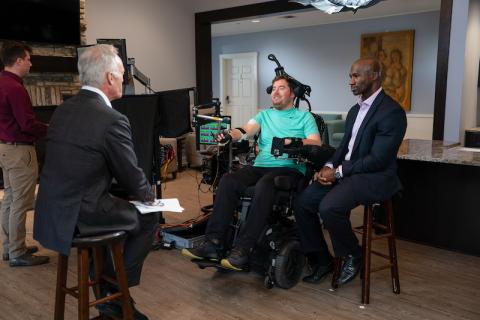Holding his wife’s hand brings Brandon Prestwood to tears.
That’s because, more than a decade ago, this seemingly simple act was stripped from the North Carolina man when he lost part of his arm in an industrial accident.
Now, thanks to researchers at Case Western Reserve University and Louis Stokes Cleveland Department of Veterans Affairs, Prestwood not only can touch his wife’s hand through a prosthetic—he can actually feel it.
Through implanted electrodes in his arm that receive movement signals from his brain and sensors in the prosthetic that connect to his nerves, Prestwood can feel a tingling sensation in his fingers—a restored sense of touch he hasn’t known since 2012.
Viewers across the country got an inside look at Prestwood’s story—as well as that of Austin Beggin, who was paralyzed from a diving accident in Florida in 2015—when CBS News correspondent Scott Pelley placed the 60 Minutes spotlight on CWRU’s pioneering bioengineering research in a nearly 13-minute segment that aired in March.
Restoring connection among people with amputations or paralysis is central to the work of A. Bolu Ajiboye, PhD, the Elmer Lincoln Lindseth Associate Professor of Biomedical Engineering, and Dustin Tyler, PhD (GRS ’99, biomedical engineering), the Kent H. Smith Professor of Biomedical Engineering. Tyler leads the team working on Prestwood’s high-tech prosthetic, while Ajiboye’s neuroprosthetic work with Beggin connects the body and brain through implants and computer systems.
When Beggin, who has been a quadriplegic since 2015, thinks about an action he wants to take, his brain impulses flow through implants in his skull to a computer, bypassing his damaged spine and reacting through controlled movement to achieve his goal—whether shaking a hand or taking a bite to eat.
Ajiboye’s brain-computer interface is an "astounding possibility,” as Pelley called it, and one dependent upon collaboration with partners such as the Cleveland Functional Electronic Stimulation Center, where Ajiboye is a bioengineer.
Also critical to their work: external support, whether through direct research funding or the endowed positions they hold, which can help them devote more time to research and also lend “a level of credibility that really opens doors,” Tyler said.
“Research grants are often very restricted,” Tyler continued, “so discretionary funding is truly critical to moving the work forward and exploring new ideas like ours that become the next big thing.”
And what do these “next big things” mean to people like Beggin and Prestwood?
“The world,” Prestwood told Pelley on 60 Minutes. “I was a whole person again.”
Originally published in the summer 2023 issue of Forward Thinking magazine



